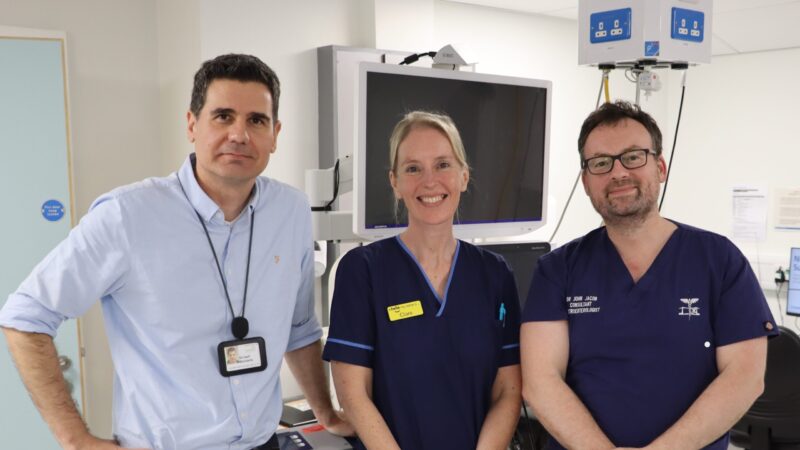
An NHS service’s new approach to treating patients with bowel issues is helping improve treatment and reduce the likelihood of people developing cancer in the future.
The gastroenterology and colorectal team at North Tees and Hartlepool NHS Foundation Trust has been holding multi-disciplinary team (MDT) meetings for patients who have been found to have large or complex colorectal polyps.
These are small growths on the lining of the large intestine (colon) or rectum.
Over two years the team has discussed more than 260 patients using this new format.
Appropriate management of these patients is helping improve patient outcomes, including reducing the likelihood of these people developing cancer in the future.
Iosif Beintaris, consultant gastroenterologist and endoscopy clinical lead and John Jacob, consultant gastroenterologist, are among the key members of the MDT, led and chaired by advanced endoscopist practitioner Clare Westwood.
As a mark of the initiative’s success, the team were invited to present it at the United European Gastroenterology Week conference in Copenhagen, Denmark, this month.
Dr Beintaris said: “It was an honour to be able to present this innovation to colleagues from across Europe and beyond – showcasing the Trust on an international level.
“The multi-disciplinary approach we have used is something that is completely unique to the region and one of just a few examples nationally.
“The meetings are about having the collaboration of the colorectal team and surgeons, radiologists, pathologists and patients – helping to minimise benign surgery and lead to a better patient experience.
“All of this has been achieved using state-of-the-art techniques which are minimally invasive and safer for patients.”
Options for therapy include standard endoscopic (through the telescope) techniques and more advanced therapies such as endoscopic submucosal dissection (ESD) and full thickness resection (eFTR).
Before the introduction of such therapies, many more patients would have undergone major bowel surgery to remove a complex polyp.
Discussing individual cases at a MDT meeting means that all options for therapy can be explored.
Planning for the procedure is also discussed within the meeting, including any specific patient factors which may be important to the procedure.
Following the MDT meeting, patients are generally offered an appointment with a specialist nurse within a complex polyp clinic. The clinic appointment offers the opportunity for shared decision making discussion with the patient.
Risks, benefits and alternatives to potential treatment options are discussed and patient perspectives considered.
The MDT meetings have also had an educational element for junior and trainee clinicians of all specialities, improving team members’ understanding of available therapeutic options to treat polyps and reinforcing the importance of high quality initial assessment of polyps.
Clare Westwood, who authored the piece presented at the event, said: “The work has demonstrated the effectiveness of the multi-disciplinary team approach – patients are having better outcomes as they are receiving the most appropriate care for their condition.”